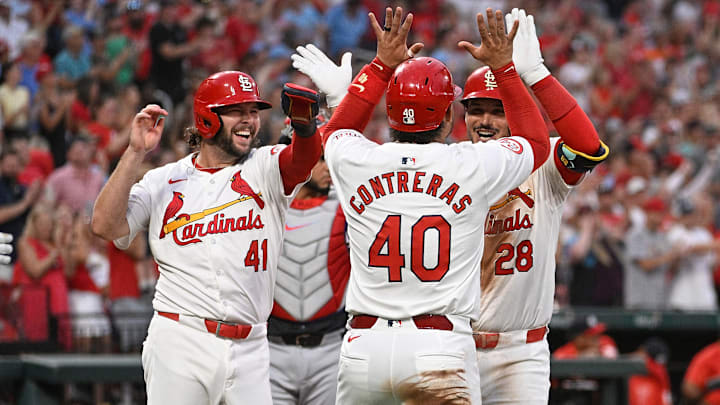"Reset" is just the new way of saying "rebuild".
What was once common practice among a half dozen or so teams in the 2010s has become taboo in today's game. It was quite often that baseball would see five or more teams seemingly fail on purpose in any given baseball season. This process was given a few different names: tanking, rebuilding, and retooling. Regardless of its nomenclature, it was quite obvious what teams like the Houston Astros, Chicago Cubs, Detroit Tigers, and several others were doing throughout the 2010s.
Now, front offices and ownership groups are being creative. Terms like "rebuild" and "tanking" scare fans away from the stadiums; that's an important revenue stream being cut off for these billionaires and brain trusts.
In Monday's press conference, leaders for the St. Louis Cardinals Bill DeWitt III, Bill DeWitt Jr., John Mozeliak, and Chaim Bloom answered a barrage of questions about the future of the organization. The panel of organizational leaders was adamant that this isn't going to be a time where the team will plummet in the standings; they still intend on being competitive.
"I don't want to focus on the word 'rebuild'," said President of Baseball Operations John Mozeliak. "I'd like to focus on the word 'reset'."
"I usually equate the term 'rebuild' to be stripping it down to the core, using replacement level players, and start from scratch," added team president Bill DeWitt III. "I don't think that's what this is."
The executives and owners were very pointed with their words here. While no commitments were made at the press conference to trading away pricey veterans such as Nolan Arenado, Sonny Gray, Ryan Helsley, and Willson Contreras, one point was made clear: the team is focusing on its young players and player development process.
This isn't necessarily a bad thing for the long-term health of the team. Having a consistent pipeline of major-league-ready players helps keep an organization healthy and set up for long-term success. However, the downside of this approach is that the period between deciding to "reset" and seeing the fruits of a team's labor could be lengthy.
Fixing a farm system takes longer than one season. The New York Mets, under ownership from Steve Cohen, attempted to rebuild their farm system while spending hundreds of millions of dollars in free agency. Cohen assumed money could be the solution, but that wasn't the case, and he pivoted to building up the farm system with the help of president of baseball operations David Stearns.
For fans of the Cardinals, they need to be prepared for things to get worse before they get better. This isn't to say the Cardinals don't have a strong crop of young players; quite the opposite actually.
Masyn Winn has taken the next step this year. Ivan Herrera has shown he can hit at the highest level of baseball. Alec Burleson, Lars Nootbaar, and Brendan Donovan can all be reliable role players. Jordan Walker is still only 22 and could be a special player. Prospects like Tink Hence, Quinn Mathews, and JJ Wetherholt could be great players down the road. The Cardinals have plenty of young players who are talented.
However, don't underestimate the impact that veteran players have on a team and in a locker room. John Mozeliak focused his efforts last offseason on procuring these veterans with playoff experience to help the young players grow.
I don't foresee the Cardinals losing more than 90 games in the next two years; they have a competitive roster already. However, the days of the Cardinals aiming for 90 wins and division titles may be put on pause for the time being. 2025 will be a year where the minor league players get the most attention. The major league roster won't be neglected, but resources will be allocated elsewhere for at least a year.
Growth should be evident in 2026, but without a large bucket of money being dedicated to free agency and player acquisition, a fully internal lineup will have a difficult time going up against the behemoths of baseball like the Los Angeles Dodgers, New York Yankees, New York Mets, and Philadelphia Phillies.
Cardinal fans have become accustomed to success and postseason baseball since the turn of the century. As the organization enters a new era of operations, things may get worse before they get better.
